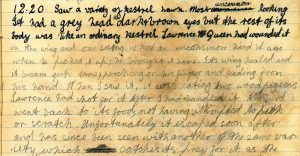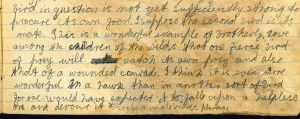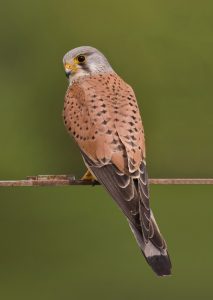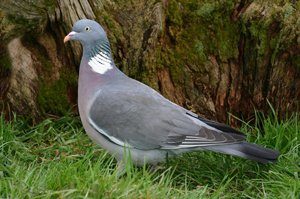A long entry in the Viola’s diary finds her exploring the grounds at Seton Lodge. The entry is very detailed and covers two birds we have explored before: Woodpigeon and Kestrel. Our previous blog entries have discussed both Woodpigeons and Kestrels so click here and here to find out more about the birds.
The main focus of the entry of concerns a wounded Kestrel and Viola’s bond with it as it recovers. The Kestrel had been shot by Lawrence McQueen but after a thorough search, we’re not entirely sure what role Lawrence played on the estate. If you have any ideas please get feel free to get in touch!
The recovery of the Kestrel and Viola’s relationship with it is lovely passage best read in full below. At the end, Viola correctly identifies that Kestrel is a male due its distinctive grey head.
Enjoy!
Transcript, Page 11
Nov 27th 1919 Seton Lodge 12.00 am
I saw an enormous wood pigeon, twice the size
of an ordinary one. It had lovely pinky-grey feathers on
its breast & greeny-grey on head and neck. It was dead so
I looked at it quite close.
12.20 Saw a variety of kestrel hawk. Most uncommon looking
It had a grey head* dark & brown eyes but the rest of its
body was like an ordinary kestrel. Lawrence McQueen had wounded it
in the wing and seeing what an uncommon kind it was
when he picked it up; he brought it home. Its wing healed and
it became quite tame; perching on his finger and feeding from
his hand. When I saw it, it was eating two wood pigeons
Lawrence had shot for it. After I had handled it the bird
went back to its food, not having attempted to peck
or scratch. unfortunately it escaped soon after
and has since been seen with another of the same var-
iety, which catches its prey for it, as the
bird in questions is not yet sufficiently strong to
procure its own food. I suppose the second bird is its
mate. This is a wonderful example of brotherly love
among the children of the wilds that one fierce bird
of prey will catch its own prey and also
that of a wounded comrade. I think it is even more
wonderful in a hawk than in another sort of bird
for one would have expected it to fall upon a helpless
one and devour it. *Hereby a male birds plumage




